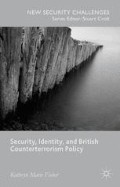Abstract
In 1979 Secretary of State for the Home Department Merlyn Rees (Lab) spoke in the House of Commons on the issue of renewing the Prevention of Terrorism (Temporary Provisions) Act 1976 (PTA) given the law’s exceptional nature with respect to concerns over a suspension of liberty. Rees agreed that “the powers contained in this Act are exceptional” and “that the Act represents a temporary infringement of civil liberties”, but he also stated his belief that “it was, and remains, a necessary infringement … to ensure that the police have adequate powers to deal with a savage and dangerous minority who have no respect for the life or civil liberties of others”.1 The simultaneous acknowledgment and legitimation of exceptionality in light of a “dangerous minority” enabled a reassertion of counterterrorism’s necessity in part by reference to its temporary status, even as these measures would become a normalized benchmark for future permanent lawmaking. As remarked by Donohue, emergency measures were initially positioned as “extraordinary moves designed to meet the needs of a passing emergency” but as time went on “became standard and unexceptional, a baseline from which further extraordinary powers could be introduced”.2 Government leadership moved from Labour to Conservative in 1979, but through the 1980s we see a continued criminalization separating terrorists from political dissidents and ordinary criminals.
Access this chapter
Tax calculation will be finalised at checkout
Purchases are for personal use only
Preview
Unable to display preview. Download preview PDF.
Notes
Laura K. Donohue, “Civil Liberties, Terrorism, and Liberal Democracy: Lessons from the United Kingdom,” BCSIA Discussion Paper 2000–05, ESDP Discussion Paper ESDP-2000–01, John F. Kennedy School of Government, Harvard University (August 2000), 40.
Lord Glenarthur (Con): Terrorism, 4 March 1986, Parliamentary Debates, Lords, 6th ser., vol. 472, col. 90. On the phrase “international terrorism” in academic research, see Robert O. Slater and Michael Stohl, Current Perspectives on International Terrorism (New York: St. Martin’s Press, 1988).
Christoph Bluth, “The use of force,” in British Security Policy: The Thatcher Years and the End of the Cold War, ed. Stuart Croft (London: Harper Collins, 1991), 47; Colin McInnes, “Conventional forces,” in British Security Policy, 45–46.
See George Lawson, Chris Armbruster, and Michael Cox, (eds.), The Global 1989: Continuity and Change in World Politics (Cambridge: Cambridge University Press, 2010 on the end of the Cold War more broadly.
See Michael Cox, Adrian Guelke, and Fiona Stephen, eds., A Farewell to Arms: Beyond the Good Friday Agreement, 2nd Ed. (Manchester: Manchester University Press, 2006) for a comprehensive volume on this period.
Clive Walker, “Prevention of Terrorism (Temporary Provisions) Act 1984,” The Modern Law Review 47, no. 6 (1984): 705.
Joe Sim and Philip A. Thomas, “The Prevention of Terrorism Act: Normalising the Politics of Repression,” Journal of Law & Society 10, no. 1 (1983): 80 (with reference to Harold Salisbury, former Chief Constable of York).
Paddy Hillyard, “London Letter: Britain’s Riot Response Echoes 1969 in Ulster,” Fortnight 228 (November 1985): 15.
Cf. Rachel Biggs, “Community engagement for counterterrorism: lessons from the United Kingdom,” International Affairs 86, no. 4 (2010): 971–981.
Clive Walker, “The Jellicoe Report on the Prevention of Terrorism (temporary provisions) Act 1976,” Modern Law Review 46 (1983): 485.
Barry Buzan and Lene Hansen, The Evolution of International Security Studies (Cambridge: Cambridge University Press, 2009), 216.
Author information
Authors and Affiliations
Copyright information
© 2015 Kathryn Marie Fisher
About this chapter
Cite this chapter
Fisher, K.M. (2015). Criminalizing Terrorism, 1979–1989. In: Security, Identity, and British Counterterrorism Policy. New Security Challenges. Palgrave Macmillan, London. https://doi.org/10.1007/978-1-137-52422-5_5
Download citation
DOI: https://doi.org/10.1007/978-1-137-52422-5_5
Publisher Name: Palgrave Macmillan, London
Print ISBN: 978-1-349-57208-3
Online ISBN: 978-1-137-52422-5
eBook Packages: Palgrave Political Science CollectionPolitical Science and International Studies (R0)

